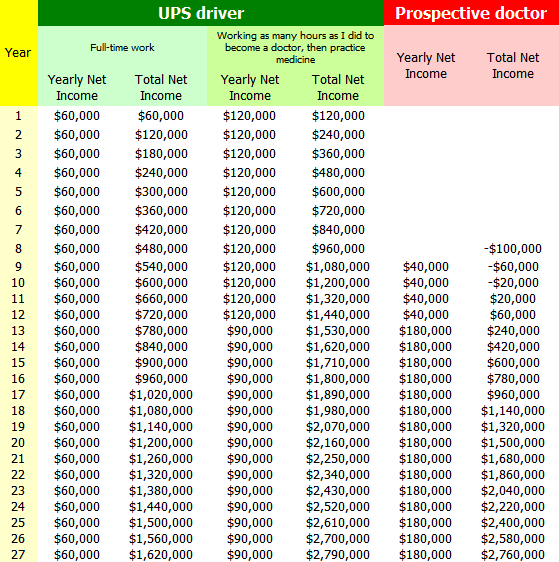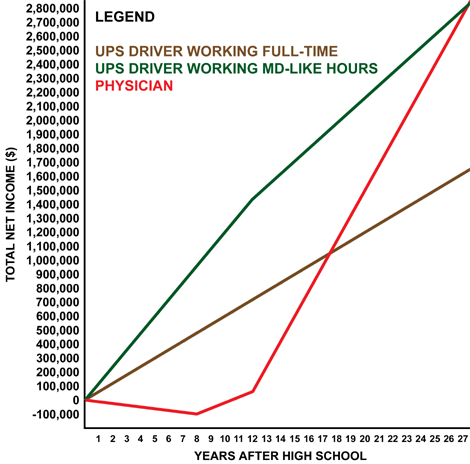I don't necessarily agree with everything this guy says, but I thought that this was interesting
http://www.er-doctor.com/doctor_income.html
A Novel Look at Physician Income: Why a medical career is the wrong career if money is one of your primary motives
The cliché about rich doctors is so well-known that it verges on redundancy in the minds of many people. However, I will demonstrate how people in seemingly much less lucrative jobs can outearn doctors. For example, who would think that a UPS driver or auto mechanic could earn more than a doctor? Probably no one except me and, in a few minutes, you, too.
The January 26, 2004 edition of U.S. News & World Report said that UPS drivers earn $60,000 per year. The average physician income is usually quoted as being $160,000 to $200,000 per year, so it may seem preposterous to claim that UPS drivers can earn more than doctors. Just wait.
According to information given to me by a UPS representative on May 13, 2005, UPS drivers require no specialized education. Thus, a person could begin working for UPS immediately after high school. In contrast, a would-be doctor requires many years of education for which he is paid nothing. In fact, doctors typically incur substantial debt to pay for college and medical school. So UPS drivers are being paid while those who aspire to become doctors are paying for the privilege of pursuing their dream.
Let's analyze how this affects their net income. We will begin looking at total net income for physicians at year 8, once they graduate from medical school with an average debt around $100,000. Students may make small amounts of money while in college, but this (and much more) is immediately spent on tuition, fees, books, supplies, and other college expenses. Beer, for instance.
🙂
This data indicates that:
It takes about 18 years for a doctor to approximately equal the lifetime earnings of a UPS driver working full-time.
It takes about 27 years for a doctor to approximately equal the lifetime earnings of a UPS driver working as many hours as I did to become a doctor, then practice medicine.
In reality, it will take longer for the doc to "catch up" for the following reasons:
I did not consider the interest that doctors pay on their student loan debts. This interest often leaves doctors with more than their original debt at the end of their residency years. Thus, while they may make $160,000 (total) during a four-year residency, they may leave it with $130,000 of debt.
I calculated this comparison using a four-year residency program during years 9 through 12. Some residency programs are shorter, but many are longer (thus keeping doctors relatively impoverished for a longer time). Furthermore, many students take longer than eight years to complete college and medical schooland those are the lucky ones who make it. Most students who try to become doctors never succeed, thus incurring debt for a career that never materializes.
The average doctor salary may not even be $180,000. Some sources pegged it at $160,000.
Doctors do not earn their average salary the first year they begin working as an attending (year 13 in this example). It typically takes several years for their income to plateau. I began working for less than half (even adjusting for inflation) what I would ultimately earn as my peak income five years later.
Doctors sometimes must "buy into" the practice they wish to join. They can't just show up and say, "OK, I'm working now, so start paying me." For that privilege, they may have to shell out $100,000 or more, which is sometimes demanded as an up-front fee. Few young doctors have that kind of money, so they usually must borrow itfurther increasing their debt.
Because of their schooling, the earning years for doctors are compressed into a shorter period of time, thus increasing their income tax rates relative to UPS drivers. Translation: Even if the doctor earns the same total amount of money as a UPS driver, the doc's tax rate will be higher, leaving him with less after-tax income.
Doctors must pay steep licensing fees to state and federal government regulatory agencies. They could also be sued and lose everything they've ever made.
Students often receive money from relatives and sometimes family friends because they are needy students. UPS drivers, and most other adults, are not similarly showered with such money. This money is rarely reported to the government or included in statistical analyses, so the educational cost is actually higher than you may think.
The burnout rate for doctors in some specialties is so high that doctors may quit well before age 65. For example, the average longevity for ER doctors is nine years.
Doctors do not work anything close to a 40-hour week! I worked about 110 hours per week (see * below) during my training. As an attending physician, I averaged about 40 hours per week of paid work and 15 to 20 (or more) hours per week of unpaid but mandatory work, such as working past the end of my shift to "clean up" (complete the care for) patients, do dictations, sign medical records, fill out insurance and other forms, attend various staff and committee meetings, participate in CME (continuing medical education) activities, and on and on. To make this a fair comparison for income potential, we should consider what a UPS driver could make if he worked two shifts (or another job) for years 1 through 12, then a half-time job in addition to his primary UPS job. Therefore, after 12 years such a UPS driver who worked as many hours as I did could have made $1,440,000. After 18 years, the total income would be $1,980,000, easily surpassing the total doctor income. The doctor might catch up after 27 years, if not for the aforementioned factors.
* What about the new 80 hour per week work restrictions for residents? First, it is still equivalent to working two full-time jobs. Second, that is 80 hours per week spent in the hospital. It does not account for the substantial amount of reading that residents must do in their "off hours."
UPS drivers typically do not seem to be as wealthy as doctors because, like just about everyone else, they usually begin spending money as soon as they make it. But what if we made this comparison even more fair, and had the UPS driver live as frugally as the student/doctor for years 1 through 12? If a UPS driver scrimped as I did, he could invest most of his salary, reaping the benefits of many years of compound interest.
If you are still debating about the financial wisdom of forgoing a doctor's smock for the seemingly plebeian brown UPS uniforms, consider this: Like many other workers, UPS drivers receive a raft of benefits. Many doctors receive nothing but salary (that was the case for almost every job I had as a physician). As an independent contractor, I received no health insurance, dental insurance, optical insurance, unemployment insurance, life insurance, sick pay, overtime pay, personal days, workers' compensation benefits, or pension. Furthermore, I didn't just pay the usual Social Security contribution; I also paid the portion normally contributed by the employer. A state "Small Business" tax further eroded my earnings. And I had to buy my own uniforms and pay someone to embroider my name on them!
UPS drivers are well-paid, but receive less than some other truck drivers. In the December, 2004 Time Inside Business, Bill Zollars, chairman and CEO of Yellow Roadway, the largest trucking firm in the United States, said that his average driver makes $70,000 per year in addition to good benefits.
If maximizing income is your goal, forget about being a truck driver or a doctor. On February 18, 2004, Paul Harvey reported that auto mechanics willing to move to in-demand areas can earn up to $120,000 per year, with employers eager to hire them offering inducements such as paying for their tools and education (some technicians earn two-year certificates or degrees in auto repair, while other receive only high school-level training).
If you want even more money, consider working as a contractor putting in basements. One of my friends, a well-to-do pharmaceutical representative, grumbled how he made less money than his uneducated brother-in-law who worked six months of the year building basements, netting him over $350,000 (adjusted for interim inflation). Furthermore, he usually arranged his deals so he was paid in cash, which enabled him to hide most of his income from the IRS.
Perhaps you want a job that is less intellectually demanding than building basements. If so, do what I used to do: mow lawns. At my peak, I earned wages that are now equivalent to $100 per hour. And that was just payment for my own labor. If I were smarter, I would have hired people to work for me, paid them $20 per hour, and kept the rest as profit. I could also build more of my inventions that increase the efficiency of lawn mowing, thus decreasing the time required to mow a yard. Customers pay for getting their lawns mowed, not for how many hours you waste on mowing with antiquated technology.
Want more examples? According to Forbes magazine (March 15, 2004), Oneida's workers in New York average $30 per hour with benefits. That's $60,000 per year for making eating utensils. Need more dough? In "Confessions of a Personal Trainer" in the July 12, 2004 edition of Newsweek, Mike Torchia said that he makes $150 per hour. That's $300,000 per year for 40-hour workweeks . . . for helping housewives shed flab. In the ER, I made half that for saving lives and working much longer weeks after an incomparably longer and more intensive education.
click the link


